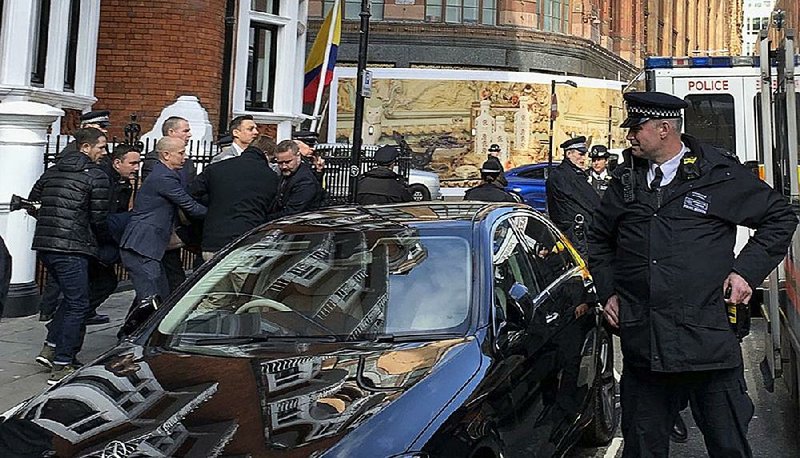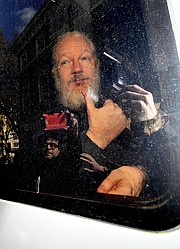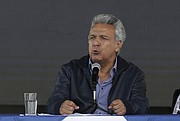Prosecutors in the Eastern District of Virginia on Thursday unsealed a conspiracy-to-commit-computer-intrusion charge against WikiLeaks founder Julian Assange, who had been arrested by British police at the Ecuadorean Embassy in London.
Assange is accused of agreeing to help former Army intelligence analyst Chelsea Manning break a password to the Defense Department's computer network in 2010. That, prosecutors said, would have allowed Manning to log in anonymously. The indictment does not include evidence that Assange and Manning ever succeeded.
Police arrested Assange after Ecuador revoked the political asylum that had protected him in the embassy, and he was taken before a British court -- the first step in an extradition battle that he has vowed to fight.
Ecuadorean President Lenin Moreno said he decided to evict the 47-year-old Assange from the embassy after "repeated violations to international conventions and daily-life protocols," and he later lashed out at Assange during a speech in Quito, calling the Australian native a "spoiled brat" who treated his hosts with disrespect.
Assange took refuge in the embassy in 2012 after he was released on bail in Britain while facing extradition to Sweden on sexual assault allegations that have since been dropped. He refused to leave the embassy, fearing arrest and extradition to the U.S. for publishing classified military and diplomatic cables through WikiLeaks.
Video posted online by Ruptly, a news service of Russia Today, showed several men in suits pulling a handcuffed Assange out of the embassy and loading him into a police van while uniformed British police formed a passageway. Assange, who shouted and gestured as he was removed, sported a full beard and slicked-back gray hair.
He later appeared in Westminster Magistrates' Court, where District Judge Michael Snow wasted no time in finding him guilty of breaching his bail conditions, flatly rejecting his assertion that he had not had a fair hearing and a reasonable excuse for not appearing.
"Mr. Assange's behavior is that of a narcissist who cannot get beyond his own selfish interests," Snow said. "He hasn't come close to establishing 'reasonable excuse.'"
His next appearance was set for May 2.
The U.S. case -- focused solely on a handful of interactions with Manning nine years ago -- suggests the Department of Justice is hoping to avoid a fight over the First Amendment protections. Attempts to prosecute Assange under President Barack Obama faltered out of concern that doing so would be akin to prosecuting a news organization for publishing classified material.
Soon after taking office, then-Attorney General Jeff Sessions began to talk with Dana Boente, at the time both the U.S. attorney in the Eastern District of Virginia and the acting deputy attorney general, about charging Assange. Prosecutors -- some of whom had been skeptical of the case -- took a second look, people familiar with the matter said.
Asked in April 2017 about his concern about leaks and whether it was a priority for the Justice Department to arrest Assange, Sessions said, "We are going to step up our effort and already are stepping up our efforts on all leaks" and added, "Yes, it is a priority ... whenever a case can be made, we will seek to put some people in jail."
Assange was indicted in March 2018 -- just within an eight-year statute of limitations on the conspiracy crime. But a grand jury in Alexandria, Va., is continuing to investigate, and Manning is currently in jail for refusing to testify before them. Prosecutors can add to the indictment until Assange is extradited from the United Kingdom.
Barry Pollack, an attorney representing Assange in the United States, maintained that even this limited case imperils freedom of the press.
"While the indictment against Julian Assange disclosed today charges a conspiracy to commit computer crimes, the factual allegations against Mr. Assange boil down to encouraging a source to provide him information and taking efforts to protect the identity of that source," Pollack said. "Journalists around the world should be deeply troubled by these unprecedented criminal charges."
THOUSANDS OF RECORDS
Before the interactions regarding the password, Manning had already given WikiLeaks hundreds of thousands of classified records, prosecutors allege. The material included four nearly complete databases, according to prosecutors, comprising 90,000 reports from the Afghanistan war, 400,000 reports from the Iraq War and 250,000 State Department cables.
Manning told Assange in a March 8, 2010, chat that she was "throwing everything" she had from Guantanamo Bay detainee reports at him, according to the indictment.
"After this upload, that's really all I've got left," she added.
"Curious eyes never run dry in my experience," the indictment says Assange responded.
"Any good at IM-Hash cracking?" Manning asked Assange soon after, according to records produced at her military trial in 2013. The part of the password Manning wanted help decoding was stored as a "hash value" in a Defense Department computer file she was not supposed to access, according to prosecutors.
"Yes," was the reply. When Manning sent a string of numbers, according to the military prosecutors, Assange replied, "Passed it on to our guys."
Prosecutors said in the indictment unsealed Thursday that days later, Assange told Manning that he had had "no luck so far."
Manning was found guilty of espionage, theft and computer crimes; her 35-year sentence was commuted by Obama in 2017. Prosecutors have argued that she has never fully revealed the extent of her interactions with WikiLeaks.
At her court-martial in 2013, Manning said she began providing information to the group in February 2010 and did so entirely on her own initiative. Military prosecutors argued that the relationship started months earlier, not long after Manning deployed to Iraq.
The case against Assange was revived under President Donald Trump, after WikiLeaks released secret CIA cyber tools. The Justice Department has in this administration waged an aggressive crackdown on disclosures of classified information, more than tripling the number of leak investigations in Sessions' first six months on the job.
When asked at the White House about the arrest, Trump said, "It's not my thing," and "I know nothing about WikiLeaks," despite praising the anti-secrecy organization dozens of times during his 2016 campaign.
"I know there is something having to do with Julian Assange. I've been seeing what's happened with Assange and that will be a determination, I would imagine, mostly by the attorney general, who's doing an excellent job. So, he'll be making a determination. I know nothing really about him," Trump said Thursday.
Before the 2016 elections, WikiLeaks released tens of thousands of emails that had been stolen from the Democratic National Committee and from Hillary Clinton's campaign chairman, John Podesta, in cyber hacks that U.S. intelligence officials concluded were orchestrated by the Russian government. Russian military intelligence officers charged by special counsel Robert Mueller discussed the timing of the disclosures with WikiLeaks, according to an indictment, "to heighten their impact on the 2016 presidential election."
"The bottom line is that he has to answer for what he has done," Clinton said later Thursday, at a speaking event with husband Bill Clinton.
In Assange's native Australia, Prime Minister Scott Morrison told Australian Broadcasting Corp. that he had no plans to intervene in the case as the charge was a "matter for the United States" and had nothing to do with Australia.
Ecuadorean officials suggested that Assange's behavior was to blame.
Interior Minister Maria Paula Romo said Assange's mental and physical health worsened while he was holed up, and he began to act aggressively toward his hosts, including smearing feces on the walls of the embassy.
In a speech in Ecuador, Moreno called him an ungrateful and "miserable hacker" who treated embassy officials poorly.
"When you're given shelter, cared for and provided food, you don't denounce the owner of the house," Moreno said at an event outside Quito.
"From now on we'll be more careful in giving asylum to people who are really worth it and not miserable hackers whose only goal is to destabilize governments," he added. "We are tolerant, calm people, but we're not stupid."
Information for this article was contributed by Rachel Weiner, Ellen Nakashima and Matt Zapotosky of The Washington Post; and by Danica Kirka, Kelvin Chan, Gregory Katz, Joshua Goodman, Gonzalo Solano, Eric Tucker, Jonathan Lemire and Darlene Superville of The Associated Press.
A Section on 04/12/2019



